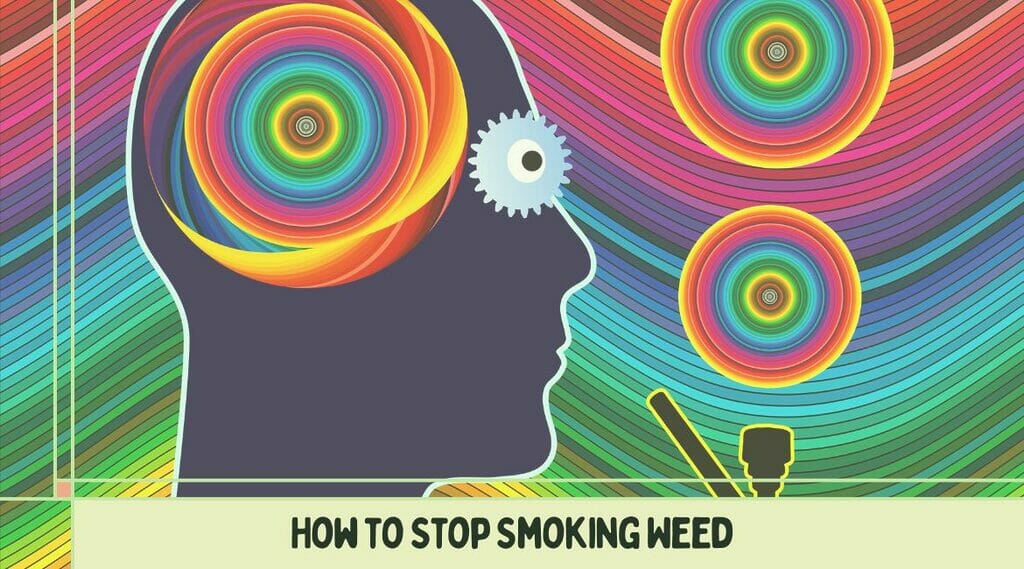Tired of your weed habit and don’t know how to stop smoking weed? You don’t have to go it alone. This guide has the tools and facts needed to help you break away. Learn how to ditch the habit and start fresh.
Let’s get started on this new chapter!
What is Marijuana Addiction

Marijuana use is smoking cannabis products. This causes an immediate effect. But why is it so hard to quit?
When smoked often, it can lead to physical and psychological reliance. Physical cravings can cause withdrawal symptoms. Psychological cravings are to satisfy emotional needs. Long-term use requires more marijuana for the same feeling, and yes at that point unfortunately we can talk about cannabis or marijuana addiction!
Factors such as genetics, mental health problems, and peer pressure can also cause drug abuse and addiction. But anyone can become addicted if not careful.
How Does Smoking Marijuana Use Affect The Brain

Smoking marijuana is widely accepted as a recreational activity. However, its health effects are no joke. Though there is inconclusive debate about cannabis use, it is important to be aware that chronic marijuana use can lead to mental health issues and psychological symptoms.
Research indicates that marijuana affects certain parts of the brain related to pleasure and movement control. Marijuana smokers may experience memory problems and difficulty concentrating for long periods.
Smoking regularly can also cause changes in behavior and feelings, such as intense cravings for more drugs or feeling ‘high’ even when not using. Plus, frequent marijuana use is linked to third-hand smoke exposure, which can slow reaction time and hamper problem-solving, motivation, and concentration.
Other Effects of Smoking Cannabis
Smoking cannabis can cause a variety of side effects. These range from reduced appetite and difficulty focusing to a chronic cough. Prolonged use can also lead to other issues, such as an increased chance of dependency on harder drugs and an increased risk of mental health disorders.
The physical effects of smoking cannabis can last up to a few hours after each session. Long-term effects, however, can take weeks or months to go away.
Researches have shown that smoking cannabis has both short-term and long-term impacts on physical health. Common short-term side effects include a fast heart rate, memory problems, dry mouth, red eyes, and dizziness. Long-term side effects can include difficulty breathing and an increased risk of bronchitis or lung cancer due to tar compounds in cannabis smoke.
The long term issues related to smoking marijuana are often more worrying than immediate impacts. Individuals who smoke weed for a long time may have trouble solving problems and concentrating, as well as potential mental health disorders such as paranoia or depression. These are similar to issues associated with other drugs, such as alcohol or stimulants.
It is essential for people trying to quit smoking cannabis to understand the full range of possible physical and psychological effects that come with prolonged marijuana use, in order to prevent any adverse outcomes.
The Importance of Quitting Smoking Weed
Smoking weed can be dangerous because of its effects, it can affect the reality and judgment, and can cause physical and psychological issues. It can lead to substance abuse and a substance use disorder.
As long as you know your limits and can manage your life with smoking weed, or when you don’t have access to weed and don’t have any withdrawal syndromes, yes, I’m talking about moderate cannabis consumption, it is a different story.
But when the Cravings make it tough to quit, then it’s important to learn how to stop smoking weed!
Some Tips to Quit Smoking Weed

Breaking the habit of smoking weed can be difficult. But with self-assessment and proper prep, quitting it cold turkey or gradually is possible. Cannabis affects everyone differently – and it’s important to be aware of the risks and make a plan that works.
Gather all the facts before starting. Consult a healthcare provider for advice and info on quitting marijuana. Quitting cold turkey or reducing usage until totally ditching are both popular approaches.
Cold Turkey
If cold turkey, set a realistic quit date and stick with it. Build mental strength and stay committed. Consider lifestyle changes like sleep hygiene, socializing without smokers, and replacing smoking with healthier habits like walking or yoga. Or seek out individual or group therapies (CBT) to help break the habit.
Reducing Usage
If reducing usage, set achievable mini-goals. This makes it easier mentally and creates positive reinforcement. Experimentation will help refine strategies tailored to you. Be aware of hunger cravings. Serious commitment from family, friends, and yourself, with medical expertise, will aid recovery. Through abstinence and duration, opportunity will present without dependency.
Coping with Marijuana Withdrawal Symptoms
Committing to break a weed-smoking habit is a big step. Be aware of the withdrawals that could come with it. These effects can range from mild to intense. The most common are headaches, nausea, irritability, sleep disturbances, fatigue, restlessness, depression and food cravings. Some may even experience anxiety or paranoia for weeks or months after quitting.
To help, take deep breaths and use healthy coping strategies like exercise or meditation.
The severity and length of withdrawal depend on individual factors. It could be a long process. But, with determination and support, it will be easier to make this transition and reduce the harms of substance abuse.
So make the right choice and break the habit!
Staying Motivated to Quit Smoking Marijuana

Quitting marijuana can be tough, but staying motivated is key. To break the habit, you need determination and commitment. Try motivational enhancement therapy (MET). This looks at your drug use history and finds triggers of relapse.
Remind yourself why it’s important to quit. Engage with family or support groups like AA. Make sure you have recovery tools like self-care techniques and healthy habits. Self-reflection will help you track progress and keep motivated on the road to sobriety.
Dealing with Relapse
Quitting cannabis use is hard. You need a plan to avoid temptation and cravings. Contingency management rewards you when you abstain. Get family and friends to be accountable. If you have trouble, professional help can be helpful. Cognitive Behavioral Therapy (CBT) teaches you coping skills and helps you identify triggers.
Remember, relapse isn’t failure. It’s an opportunity to commit and develop a better way to quit permanently.
How To Help Someone Else Stop Smoking Weed
Quitting weed can seem tough, but with knowledge and the right help it’s possible. Showing understanding and having patience is key when helping someone else stop smoking. An addiction expert, with medical training, can help as they understand addiction recovery, both mentally and physically.
Have a chat with your loved one about why they want to stop smoking. Talk about the great changes that’ll come from quitting – including better sleep and more motivation. After this, an addiction specialist should be contacted for help.
A supportive system is also vital. Offer your loved one other assistance, such as weekly therapy or support groups. Addiction recovery isn’t a straight line, so be ready for successes and relapses.
Helping someone quit smoking weed might seem intimidating, but with enough understanding you can make massive progress towards sobriety. Your commitment will help your loved one on their road to recovery!
Conclusion
And so, your guide for quitting marijuana comes to an end. You have taken a huge step towards a more rewarding life. Just remember, it may take time for your body to adjust and you may have some physical and mental symptoms.
Motivate yourself with small goals – congratulate yourself when you achieve them. Document your progress by writing down your thoughts or making notes as you experience changes related to quitting. You don’t need to do this alone; see a mental health professional for personalized advice and support.
It is important to be persistent while making lifestyle changes like quitting smoking: Rome wasn’t built in a day!
Frequently Asked Questions about Quitting Marijuana
Do we need professional help?

If you smoke regularly or have a marijuana use disorder, get a specialist or try cognitive behavioural therapy. CBT can help with triggers and strategies to avoid them. Young adults can also talk to peers to discuss strategies on how to stop using other drugs, including weed. You can also talk to an addiction specialist if you can’t stop on your own or relapse frequently. With guidance and support, anyone can quit marijuana!
What are some strategies for minimising withdrawal symptoms when quitting smoking weed?

Stay hydrated, exercise, eat a balanced diet, avoid triggers, and get plenty of rest.




